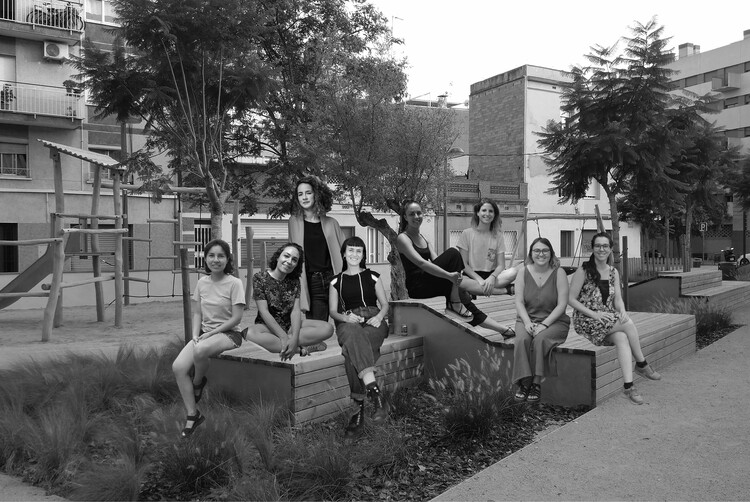
Equal Saree is an architecture studio based in Barcelona, led by three young architects: Helena Cardona Tamayo, Julia Goula Mejón, and Dafne Saldaña Blasco. All three studied at the Escuela Técnica Superior de Arquitectura de Barcelona (ETSAB), Universidad Politécnica de Cataluña, where they met while taking the subject "Architecture and Politics", taught by Zaida Muxí and Josep María Montaner. The studio is composed of 15 other women architects, in addition to the founding partners.
The young practice is a reference entity around feminist architecture in Barcelona, being specialized and actively engaged in integrating the gender perspective in urban design. Its mission, in the words of its founders, is "to build equality through space".

We wanted, through our specific knowledge, architecture and urban planning, to be able to improve our environment, the world in which we live. Some teachers, such as Zaida Muxí, promoted a change of perspective and were an inspiration to follow this path. - Dafne Saldaña Blasco, co-founder of Equal Saree

The architects present their own manifesto on what they consider feminist architecture and urbanism to be: "feminism aims to unmask the social, political, economic and legal inequalities suffered by women and people with non-normative identities, taking into account their diversity and complexity, and deconstructing stereotypes and gender roles so that all people can develop in freedom and with equal opportunities".
In turn, they declare that urban planning is a key tool for the democratization of the use of cities and that it plays a fundamental role in guaranteeing the quality of life of their inhabitants. For this reason, they seek, through the design of spaces and urban planning, to think, build and regenerate inclusive cities that consider and respond to the daily life needs of all people:
- Diverse cities: cities that do not perpetuate inequalities based on gender, social status, origin or provenance, ethnicity, health status, sexual orientation, or age, among others.
- Caring cities: that place caregiving tasks in the public sphere in order to make them visible and value them, and thus collectivize responsibility.
- Sustainable cities: respectful of their surroundings and the communities that inhabit them, from an environmental but also socio-economic perspective.

The first project that the studio carried out thinking about urban design and architecture from a feminist perspective was the Walking India Project, funded by the UPC's Center for Development Cooperation and carried out in New Delhi and other regions of India. This project also took into account other factors such as cultural and religious diversity, the type of urban structure and climate, as well as the different uses of public space due to economic inequalities.

The project was the result of more than 3 years of exchange between Barcelona and India and involved many people - and very diverse - from academia and the associative world, as many professionals from different disciplines. Walking India aims to improve the living conditions of Indian women, facilitating their access to public space and solving the lack of basic services and facilities in their neighborhoods.

Another characteristic of this studio is that it develops its projects by applying the concept of co-creation, that is, involving the people who live or will live in them. Thus, they give voice to the communities to detect their specific needs and desires, also betting on the active participation of some groups that are usually excluded from decisions about their environments, such as children and the elderly. They also believe that education is a transforming element that, when applied to collective decision-making processes, becomes a useful tool for social change.

All the aspects mentioned above are the ones they apply and work on when developing participatory processes with the educational communities (teachers, families, and other agents) and with children. An example of this is the Fem dissabte a la plaça d'en Baró project.

The objective of this project was to rethink the Plaça d'en Baró for the integration of new activities aimed at children from 6 to 12 years old. The project is based on collective reflection on the uses and design criteria of the future space, with the aim of facilitating the coexistence of diverse people. The process focused on the participation of children, combined with the visions of other users of the square, such as caregivers and the elderly.

The studio frequently works with educational spaces, especially school playgrounds, always taking advantage of the physical transformation project as an opportunity to reflect on the uses and occupation of space in terms of gender. An example of this type of project is Empatitzem.

The Empatitzem project consisted of rethinking the use of a school playground, based on its importance as a space for learning, play and coexistence. As a result, we obtained playgrounds with a more equitable distribution of spaces, an increase in quiet areas, a better use of the existing space and more diversification in play options.

Finally, it is worth mentioning another interesting project currently being carried out by the architects: La Generadora. This is a series of trainings that aim to consolidate, share and expand a line of thinking and innovative practice, more democratic about the city, urbanism, and design, and thus acquire practical tools to apply to projects, learn participatory methodologies and collective dynamics, creating a small large international network to exchange experiences and knowledge. There have already been 6 online editions and 1 face-to-face edition with international participants.

The work that the Equal Saree studio does to promote architectural and urban design with a gender perspective is an inspiration for many other emerging practices and architecture professionals in Barcelona. It is certainly worth getting to know.




















